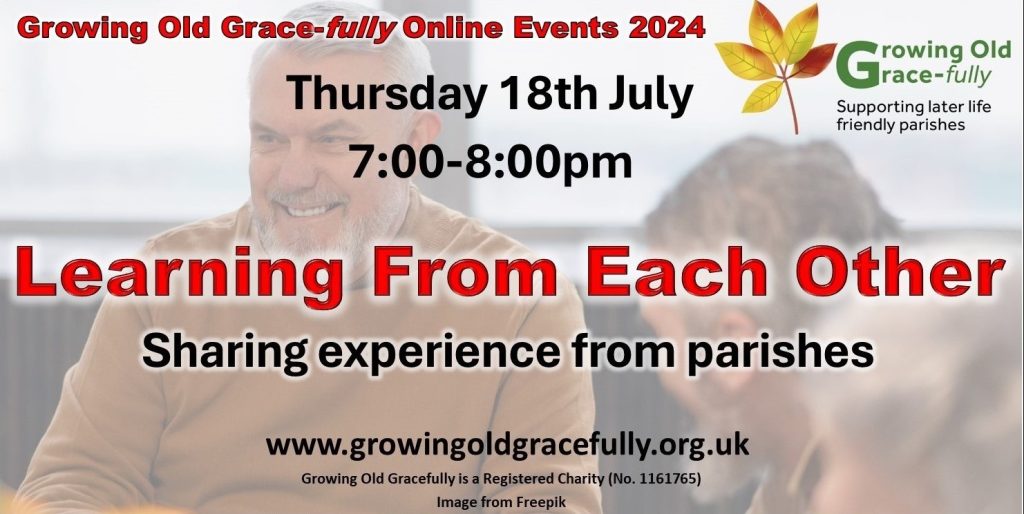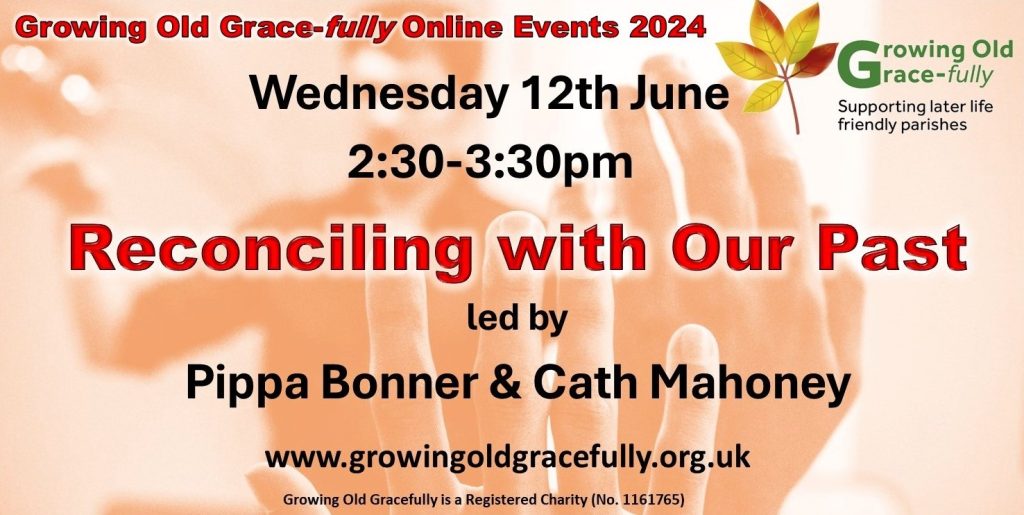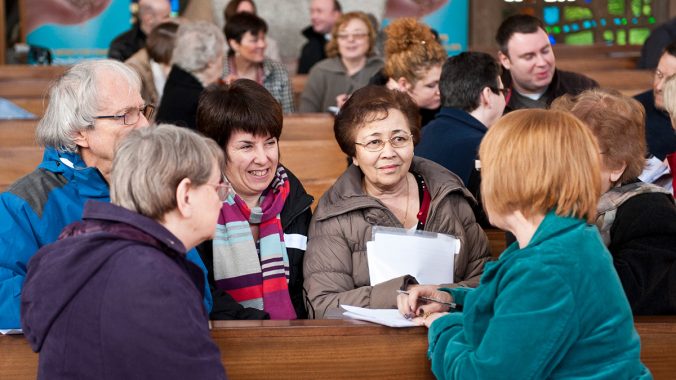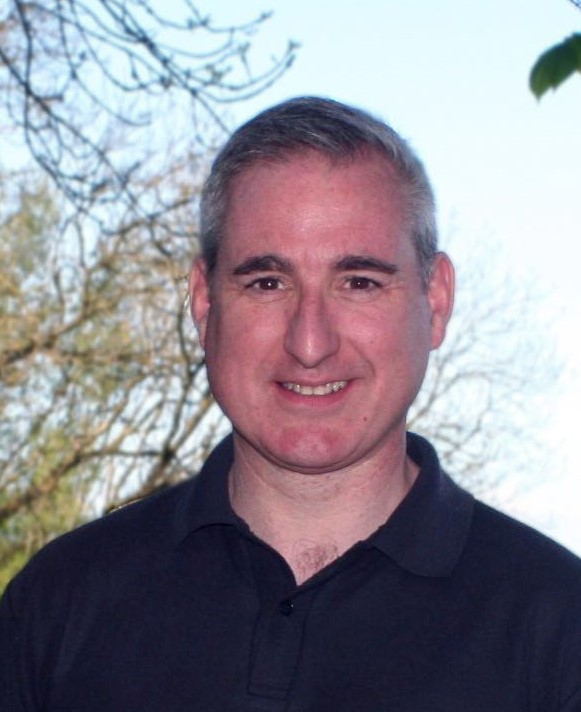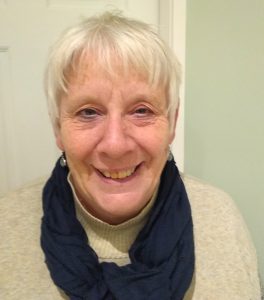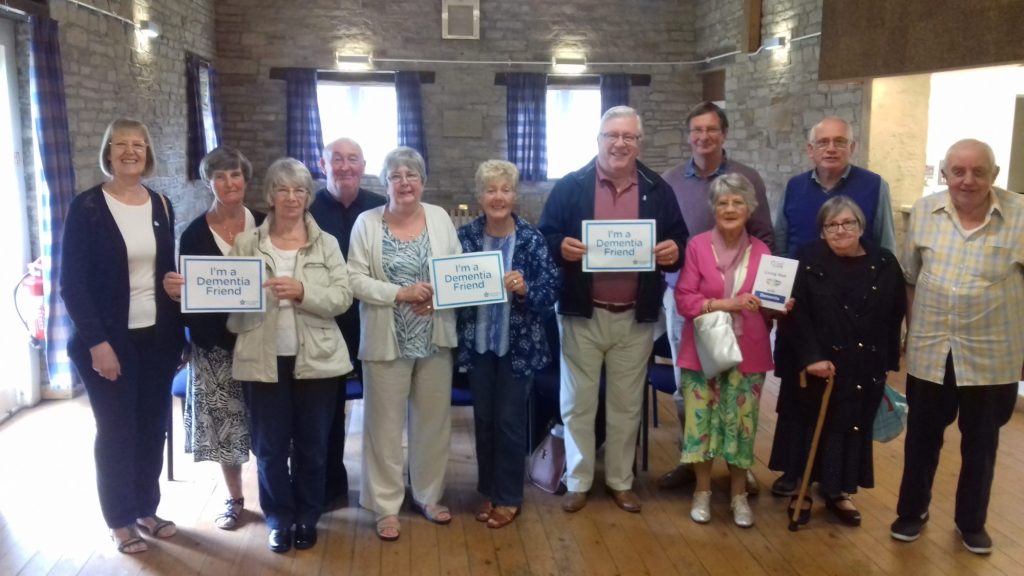| The third of Growing Old Grace-fully‘s 2024 online sessions is Learning From Each Other: Sharing Experience from Parishes on Thursday 18th July, 7:00-8:00pm. This session is about hearing examples of great work already happening, with contributions from: * Maureen Connolly from Immaculate Heart Parish, Huddersfield * Breda Theakston from the Elizabeth Prout Centre, talking about Bereavement support * Andrew Winfield from St John Vianney Parish, Leeds There will also be breakout groups to share other experiences and ideas as to how to enhance the spiritual life of older people in your own parish community and lives. The session will start and finish with prayer and reflection led by Rev. Joe Cortis, who is a Growing Old Grace-fully trustee. The session will start at 7pm and at 8pm, a Zoom link will be circulated to all attendees and the waiting room will be open from 6:55pm. To reserve your place, please book a free ticket on Eventbrite here. |
Category: Parishes later life friendly
Online Event – Reconciling With Our Past
Growing Old Grace-fully is hosting six online sessions in 2024.
The second is Reconciling With Our Past is on Wednesday 12th June, 2:30-3:30pm led by Pippa Bonner and Cath Mahoney.
Cath Mahoney is parishioner of Mother of Unfailing Help, mother and grandmother, with a background in community development, a former Growing Old Grace-fully worker and now a trustee.
Pippa Bonner is a parishioner at St Aelred’s Harrogate, a widow, mother and grandmother, with a background in social work, then running a hospice bereavement service and currently working in pastoral care with older people. Pippa is also a Trustee of Growing Old Grace-fully.
Cath and Pippa will lead the session, which will involve breakout groups.
The session will start at 2:30pm and finish at 3:30pm, a Zoom link will be circulated to all attendees in advance and the waiting room will be open from 2:25pm.
To reserve your place, please book a free ticket on Eventbrite here.
Personal Reflections on the Synod of Bishops with lay women and men in Rome October 2023
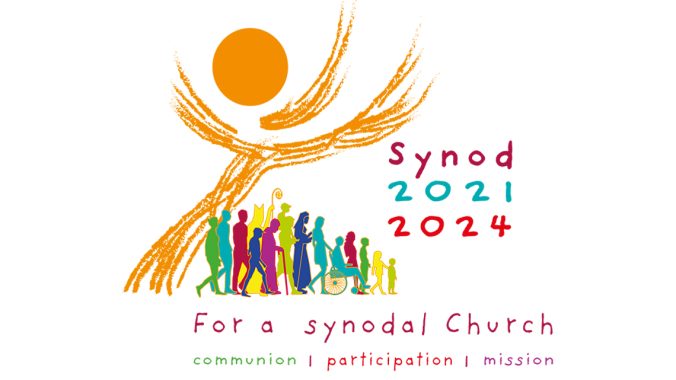
Many of us in our parishes in the Diocese of Leeds had an opportunity before the October Synod 2023 to discuss some of the issues facing the Catholic Church.
Our feedback was sent to the Diocese to be considered, to go forward ultimately to the Synod. So, instead of being a top- down process, it started at the grass roots around the world and responses were synthesised – all brought together – at diocesan, Bishops’ Conference and Continental levels. Our Bishop Marcus Stocks along with John Wilson, the Archbishop of Southwark, represented the Bishops’ Conference at the Synod, and a number of lay people, including Professor Anna Rowlands of Durham University, went to Rome to take part in the Synod. This inclusive approach was promising.
Preparation did not happen in some parishes, but it is not too late to become involved now and encourage others to do so. The Synod Part 2 meets in Rome in October 2024. Inevitably some ideas in October 2023 got diluted or left out during the synodal process, but I think us older people have become accustomed to knowing this is what can happen in all walks of life, and to continue to concentrate on the important things – and not to give up.
I hope that if you read through to the end of this Reflection you might find some aspects to feel engaged and optimistic about…
What relevance does this all have for us older people? I think it is important for us to be involved in this worldwide consideration of the future facing the Church for a number of reasons.
The Synod Part 2 takes place in October 2024 so there is not much time. There are a number of worthwhile issues to consider that were raised last October – to feed back to Rome in the autumn. The Synodal process has emphasised the importance of priests and people listening, speaking and working together, which is key for the future.
I know many of us acknowledge the future of the Church will be in the hands of younger generations, but we have a voice too…and hugely valuable experience to impart! Older people have years of experience in our families, parishes, charities and church organisations and encouragement to offer to younger people during this synodal process. We are the ones who have experienced the reforms of Vatican 11 in the 1960s and can see what still needs to happen.
A Summary Report of the First Session of the Synod was written, and I quote from its 41 pages below.
Discernment
It was proposed that “each local church equip itself with suitable and trained people to facilitate and accompany processes of ecclesial discernment.” (page 8.) “Among all the baptised there is a genuine equality of dignity and a common responsibility for mission, according to each person’s Vocation. By the anointing of the Spirit who “teaches all things’ (1Jn.2:27) all believers possess an instinct for the truth of the Gospel, called sensus fidei,” (page 9)…which can lead to a consensus of the faithful (consensus fidelium),” as at the Synod, “which is a sure criterion for determining whether a particular doctrine or practice belongs to the apostolic faith “(page 9.) Stated at the beginning of the Report, this potentially allows for inspired thinking at every level from lay people and clergy. It is encouraging for the future but we need to act on it now.
Throughout the Report references are made to more decision making in the future at diocesan level, rather than in Rome. Pope Francis has previously said this e.g. over pastoral decisions being permitted at diocesan level about divorced and remarried Catholics receiving Communion. It seems to me that he has continually been trying to devolve decision making during his papacy. Here it is reiterated and timely for inspired, sensitive to culture, inclusive, localised thinking. In my view we need to encourage our Bishops and people to work together on these ideas.
Women in the Church
It was stated (page 21) that “women constitute the majority of those who attend churches.” However, “clericalism, machismo and inappropriate use of authority continue to scar the face of the Church.” (page 22). There is a hint of considering inclusive language in liturgical texts (Page 23). Research on women deacons is to be continued and hopefully results presented next October. There have already been two Commissions which have not yet agreed to women deacons. (I know of many women who support women as deacons, while not wanting to clericalise the diaconate.) Women being included on theological programmes, seminary teaching and women judges in canonical trials are proposed. (page 23.) If we agree with these ideas, we can continue to voice them.
Seminary Training
Seminary Training should be more “linked to the daily life of communities,” so there was some mention of reform (page 25.) The Report says compulsory celibacy needs to be further discussed. I have been told that married priests are mentioned once, in the 41 pages of the Summary Report but I cannot find the reference.
Clerical abuse
The potential conflicting difficulty in abuse cases where a Bishop is both father and judge was raised (page 28.) However, dealing effectively, promptly and consistently with clerical abuse has to be continually tackled as it is so damaging and is a top priority to people of all denominations and faiths.
Attentive listening
Synodal working and the more transparent and active relationships between the Roman Curia, Cardinals, Bishops ” and more attentive listening to the voice of the local churches” was raised (page 29.)
Formation of all
Education for all, including lay people was mentioned and is a theme that, in my experience, is expressed all the time in meetings. How to listen to each other, especially with complex issues including painful excluding issues, was also raised.
Optics
For me, one of the most promising pointers from the Synod was that Bishops, women and men met in small groups to listen and speak in turn at round tables. This was instead of sitting in serried rows at previous Synods to listen, as spectators. There were some speakers in October, but apparently people remained at tables. This, to me, was a powerful symbol of the Synod.
So, where does this leave us older people?
A lot of preparatory work, offered to all parishes, but which included some of us, was undertaken, and the feedback we got from the first parish sessions was useful. We didn’t get feedback from our second parish sessions, I understand this was because the administration of it became overwhelming. However, feedback would have been useful for each of our parishes who took part.
Those who attended the Synod in Rome worked hard at a large number of issues. Christopher Lamb, until recently Rome Correspondent at The Tablet, described it as a consultative rather than a deliberative assembly. This might account for the numerous proposals raised, rather than decisions made. Is there time in our Diocese to come up with draft action plans for some of those proposals by next October for the Synod Part 2?
I think many of us over the years have raised the need for more adult theological and pastoral education locally and globally. There are some courses available but they are expensive, at a distance and few locally. Let us hope this situation changes soon as there are fewer Priests and Religious working in the Diocese, and an ever greater need for more lay people (paid and voluntary) working at all levels.
Mention of the role of women and the presence of around 40 women attenders with voting rights was, personally to me, very welcome. Ideas of how to include more women at all levels were not clear but is happening in some of the Departments in Rome. However, yet again the proposal for women deacons was, for the third time, deferred for more discussion. Deciding how women can be assimilated into the current clerical structures has to be worked out without adding to clericalism, but decisions need to be made soon either way. Many younger women, with this kind of calling, accustomed to equal opportunities in secular life are walking away.
The use of exclusive language about ‘men and brothers’ in liturgical readings to congregations with a majority of women, in my view, has to change now. Many of us already make inclusive language changes but this needs to be approved officially and the sign it would give would be powerful.
To conclude, for many of us these issues have been raised before. For us older people we have the life experience and some acquired confidence to encourage our parishes and priests to discuss and act on these issues. This can be done formally at diocesan level, Parish Pastoral Councils, parish meetings and in homilies. It can also be raised informally wherever we are at: after Mass at coffee, at prayer groups, with friends and people we don’t yet know around us. We have now been given the opportunity to speak and listen to each other, and to try and give some feedback to parishioners, priests and our Bishop about what we think and feel.
What do you think?
Pippa Bonner, GOG Trustee January 2024
A message from the Board – December 2023
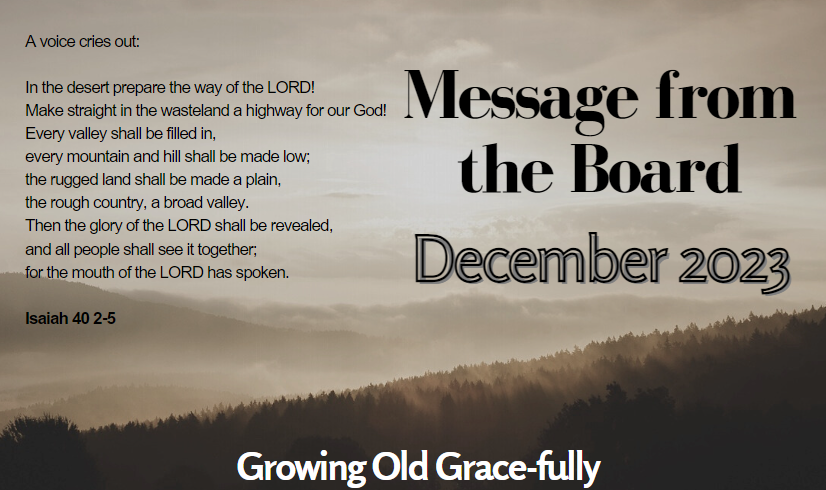
Dear Friends,
I am writing as we begin the next four weeks of Advent preparing for the gift of God’s son to the world, to announce that our our period of waiting for a new worker for Growing Old Grace-fully is over!
I am very pleased with funding support from the Diocese, the Day for Life fund of the Bishop’s Conference and Holy Child Sisters, we have engaged a freelance worker to support our work.
Welcome to Greg Mulholland who will be working with us part-time for the next year.
Greg is an experienced communications professional and will build on the excellent work of our previous freelance workers, in taking forward the work of Growing Old Grace-fully and delivering our vision and mission.
We have a clear brief to organise Zoom meetings to support parishes to be more Later Life friendly, as well as working with two parishes more intensely to support them in their work with older people. This is of course on top of our communications to our subscribers and supporters.
Greg says, “I’m delighted to be working with Growing Old Grace-fully, to deliver its important vision and mission in our Diocese and I look forward to working with the Board, volunteers and parishes to help older people across the Catholic Diocese of Leeds experience spiritual, emotional and physical wellbeing in positive and inclusive parish communities”.
We are looking for parishes to work with us on this in the next year. Do please contact us at growing.old.gracefully@dioceseofleeds.org.uk if your parish is interested in taking part in this.
This December mailing includes an Advent reflection from a member of our board of trustees, Pippa Bonner and some suggestions for prayers which you may want to use yourself or share with other parishioners
With blessings for Advent,
Best wishes,
Carol Burns and trustees of Growing Old Gracefully
Pastoral Worker for Older people – seed funding to start a role in 2 parishes
With many people living longer and the current demographic of our churches, you are probably finding that the needs of older people in your parish are increasing.
Many parishioners go out of their way to help others as much as they can, and SVP and other groups are an essential support to many older people. These informal and formal networks of love and inclusion work well in many situations. However, with the increased need, the effects of the pandemic, and the fact that some of those volunteering are themselves feeling vulnerable, resources are stretched and some older people are at risk of slipping through the net or becoming disconnected.
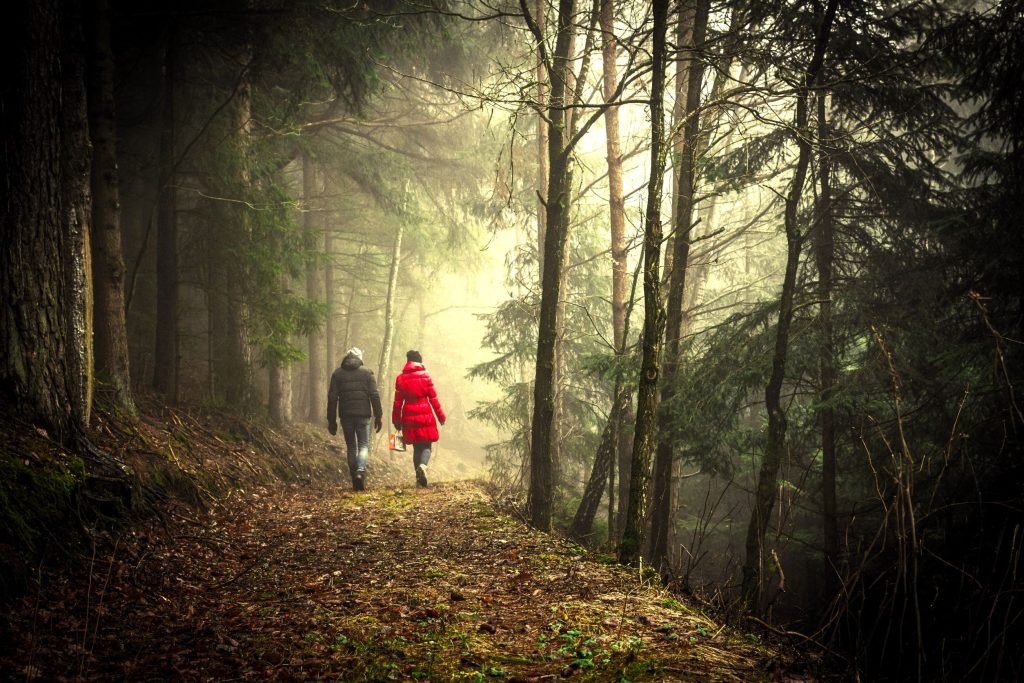
In response to this need, Growing Old Grace-fully approached funders with an idea for a Pastoral Worker/Lay Chaplain for Older People role, to see if it could be trialled in some parishes in the Diocese of Leeds.
The Ladies of the Grail caught the vision for this demonstration project and generously awarded some seed funding to be used in our Diocese.
What would a Pastoral Worker/Lay Chaplain do?
In partnership with the Parish Priest and Eucharistic Ministers, and working closely with relevant parish groups such as the SVP, a Lay Chaplain’s role would be to be an important point of contact for older people in the parish (as well as their families and carers) particularly in terms of their spiritual and emotional life, but with a whole-life approach.
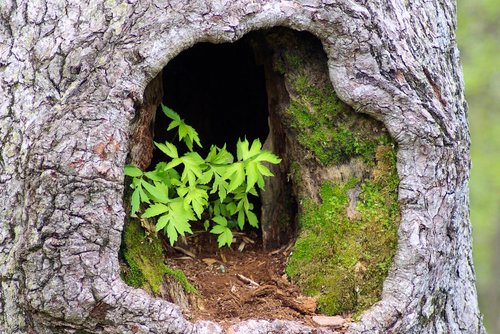
They would use a person-centred listening approach with warmth, compassion, humour and mutual respect, enabling older people to:
- be strengthened on their journey
- be more connected and included in parish life
- have their contributions valued
- access support for practical needs.
We have seed funding to help 2 parishes set up and test this model with someone fulfilling this role a few hours a week.
We are now seeking expressions of interest from parishes in the Diocese and have recently sent information about this to all priests through the Ad Clerum.
If you are interested in this idea and feel your parish could benefit from this scheme, we would encourage you to speak with your priest and others in the parish to explore the possibilities, and then contact us (see below).
If you have any queries, please do contact our Development Officer Rhoda Wu on growing.old.gracefully@dioceseofleeds.org.uk, she will be happy to help.
Some prayers and ideas shared at our Discussion Event on 4th November
About 20 of us met on Zoom on a cold evening with fireworks going off in the background! We had a good time together sharing issues and ideas around starting up and continuing activities and support for older people in our parishes at this strange time of transition.
Sister Bernadette from the Sisters of Mercy led us first in LAMENT remembering the difficult times we have come through and still have to navigate:
“As we gather this evening, we are conscious that we have lived and are living through a pandemic. This is something many of us may have never imagined.”
“The flow of life has changed, our way of life has been affected, and the crisis seems unending. Life has been difficult in so many ways and each person here tonight will be aware of that in some way, as an individual, a family, a colleague in a workplace or as a member of a Parish.”
“Our one constant through this journey of the pandemic has been our God, our companion, our comforter, our hope, our strength, our guide. The God who at times was close or who may have seemed far away.”
After a Lockdown poem, we moved on to expressing HOPE and STRENGTH as we move forward, with the words of Isaiah and prayers of commitment and faith:

We are not people of fear: We are people of courage. We are not people who protect our own safety: We are people who protect our neighbours’ safety. We are not people of greed: We are people of generosity. We are your people God, giving and loving, Wherever we are, Whatever it costs, For as long as it takes Wherever you call us.
We then broke into 3 DISCUSSION GROUPS on the following themes:
- Restarting or starting groups and activities
- Online or ‘in person’ or both?
- Supporting the vulnerable and reconnecting with the disconnected
GROUP 1: RESTARTING OR STARTING ACTIVITIES
With help from Hillary Wadsworth from Time to Shine, some of the themes discussed here were:
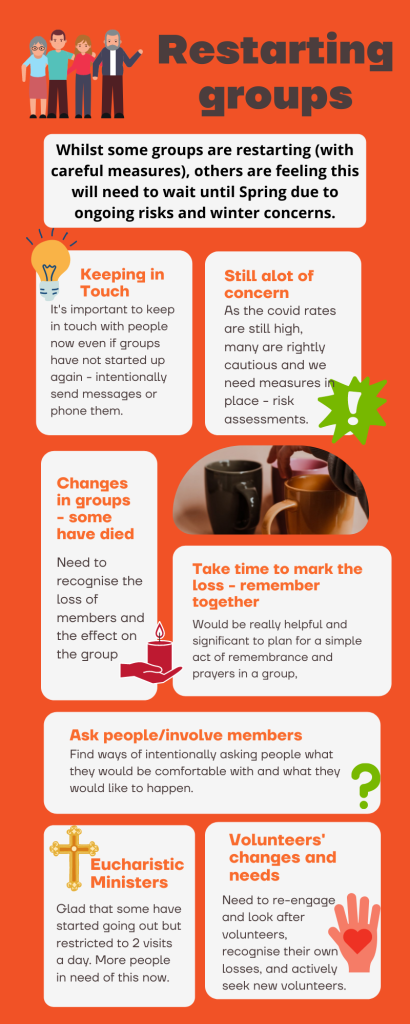
GROUP 2: ONLINE OR IN PERSON OR BOTH?
Rachel Beedle from Catholic Care who works with their older people’s groups facilitated this group – their main points were:
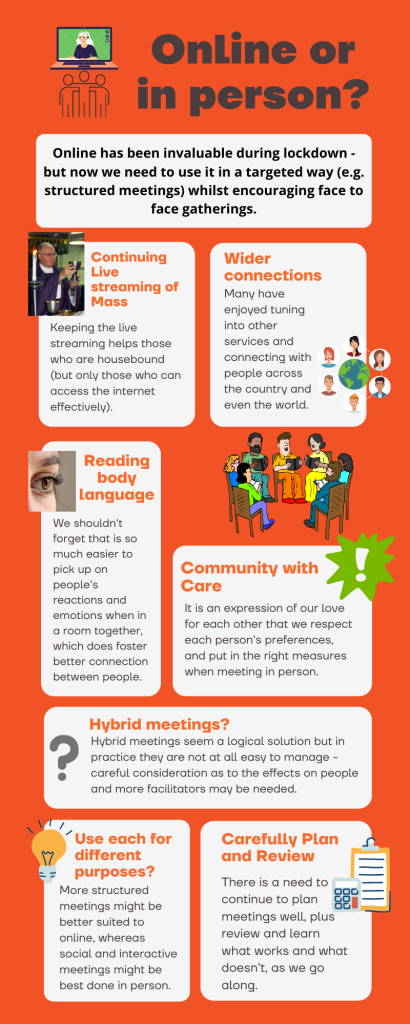
GROUP 3: SUPPORTING THE VULNERABLE AND RECONNECTING
Mo Crossley from Huddersfield facilitated this group, enabling input from SVP and others, resulting in a good discussion with the following main points:
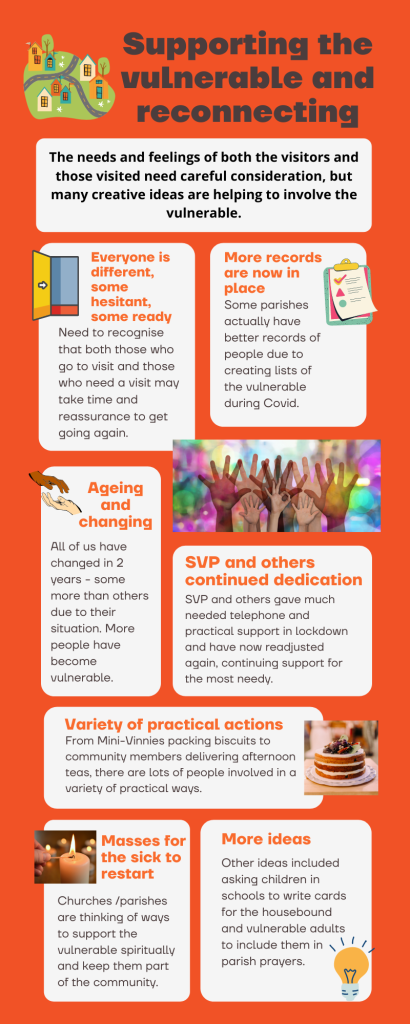
Feedback showed that attendees enjoyed both the reflections/prayers and the discussions, and we hope it was helpful to all to come together and share ideas and concerns.
We are now starting to plan for some events/content in the Spring on the theme of ‘Finding our Calling in Later Life’ – watch this space (as they say!).
A natural end – can a frank discussion of dying feel helpful?
As we age, or as our health deteriorates, we can make plans for what treatments we would wish to avoid or where we would like to be cared for. In a recent edition of The Tablet (26th May 2018), a palliative medicine pioneer explains that it’s often a surprise to patients and families that a frank discussion of dying can feel so helpful.
When I was working for MHA, a key part of the work of the Chaplaincy team in MHA Care Homes and Independent Living communities was the development of “The Final Lap” – a programme to train staff to support residents and their families as they explore what the last days of life will mean for them. My initial reaction at the time was shock, and the thought came to me “who wants to think about this?”. I came to realise this is my own fear talking, my own denial about a process that is as natural as birth. What I came to understand is that it it possible to respond to planning our dying in a positive and creative way. “The Final Lap” philosophy is based on 3 key principles:
- Create a culture that faces the reality of death openly, as part of human life, and to deliver support that makes it a more positive experience for everyone.
- Different people have different ideas about what makes a ‘good death’, so preparation and planning based around the individual’s wishes are important.
- Supporting someone who is dying can be difficult, but it can also be very rewarding. Final Lap training will help staff identify and address their support needs more effectively.
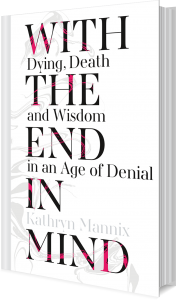 The Tablet article tells the true story of Ignatio, a man who is coming to the end of his life and finds relief and freedom in being able to talk about what he would like and, importantly, not like as part of his Advance Care Planning. The full article is behind a paywall here , and details about the author, Kathryn Mannix, and her latest book can be read here .
The Tablet article tells the true story of Ignatio, a man who is coming to the end of his life and finds relief and freedom in being able to talk about what he would like and, importantly, not like as part of his Advance Care Planning. The full article is behind a paywall here , and details about the author, Kathryn Mannix, and her latest book can be read here .
Our parishes have an important role in helping us ‘pack for the journey’. The Church offers hope and comfort because it is rooted in the belief that God made us to enjoy eternal life with Him. We are blessed with some special prayers and sacraments that give meaning to sickness and death.
Growing Old Grace-fully are thinking about offering a short session to parish groups on planning your Catholic funeral. This session will also offer the opportunity for people to start to explore some of the deeper questions and considerations for a parish in helping people think about their own end of life wishes. Is this something you think your parish might be interested in? Please get in touch with Rachel at growing.old.gracefully@dioceseofleeds.org.uk or call 07702 255142 for a chat.
Dementia Friendly Parishes in our Diocese
I was made so welcome at two different parishes in Dewsbury Deanery this month.
I enjoyed my visit to the Happy Memories Group at St Paulinus Church Hall, Dewsbury last Thursday. This group is run by volunteers and run activity groups for people with a dementia type illness and their carers. They are active, lively groups, with activities designed to stimulate and exercise both body and mind. Carers have a choice of staying for the session or having a break for the session.
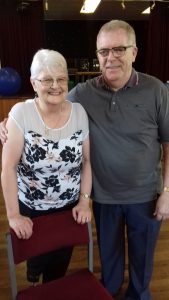 The driving force behind Happy Memories is Cath Knowles, shown here with husband Ron who also is very involved in supporting the Group.
The driving force behind Happy Memories is Cath Knowles, shown here with husband Ron who also is very involved in supporting the Group.
Cath told me “I run the Group and have done for 11 years. We are all volunteers and consist of 4 groups in total. We have around 90 people on our books and we support carers and former carers.I have applied to make our group a dementia friendly group and this is a work in progress. Although we meet at St Paulinus Parochial Hall twice a month, we are not specifically a church group and people come from all over North Kirklees to attend our groups.We also have a group that meets at St Andrews Methodist Church Hall in Mirfield twice a month, a luncheon Club Monthly and a carers friendship group monthly.”
The Group are doing much needed work to help support people living with dementia and their carers. They are supported financially by local community groups and individuals, but get no statutory funding.
Last Saturday I was back in the deanery sharing a Dementia Friends session at St Paul of the Cross in Cleckheaton. I was delighted that 25 people, including parishioners from St Mary of the Angels in Batley, came to the session and each attendee became a Dementia Friend. Parish priest Fr Nicholas commented “Simply bringing people together is important, allowing them to know that they are not facing issues in isolation”. It was very good to attend a quiet Mass after the session with some of the people I met. Thank you to all who came along for your warm welcome and thoughtful contributions.
Don’t forget that it’s Dementia Action Week from 21st-27th May 2018, and I would love to hear what your parish or local community are doing to help people live well with dementia.
Spring Pilgrimage in North Wales
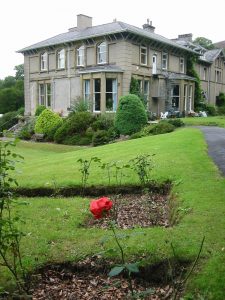 I have never seen so many wild primroses, got too hot in April by the sea in the UK, been blessed in water from 6th century St Seiriol’s Well and seen a circle of yew trees nearly 3,000 years old!
I have never seen so many wild primroses, got too hot in April by the sea in the UK, been blessed in water from 6th century St Seiriol’s Well and seen a circle of yew trees nearly 3,000 years old!
I was staying at Noddfa, a retreat centre in North Wales which I visit every year. I was on a pilgrimage following some of the Celtic saints in the area. We were mostly older people, helping each other down stone steps and up a steep Bronze Age grass burial mound where, “latterly” (i.e. over a 1000 years ago), some of the Celtic saints are also buried. As I get older I find it important to try and learn new things and be invigorated, as creation around us is growing and renewing after the winter.
We began and ended each day with Celtic prayer and music. We read about the “living water” that Jesus spoke of to the Samaritan woman at the well (Jn.4:10). Then we went to Anglesey to Penmon Priory, to the Well, Spring and 6th century stone outline of St Seiriol’s Cell. He was a hermit but people flocked to him to be blessed and healed in the water from the Well. There is an enclosed stone platform around clear water, and this was where I saw thousands of primroses in the grave yard of the mediaeval priory built by the Well.
Another day we went to Gwytherin, the site of St Winefride’s (Gwenffrewi), 7th century burial place. She was associated with Holywell, near Flint, where many visit. It is known as the Lourdes of Wales. We did not go there but to the site of the monastery where she lived and in a monastic community.There are four yew trees at the place, nearly 3,000 years old which probably were planted by Druids for their gatherings. The Christians later moved on to the site. Under the current church was the wooden monastic community where St Winefride and others lived, next to the ancient burial mound. It had a wooden church on top of the Bronze Age mound in Winefride’s day.
There is no longer evidence of these wooden structures. St Winefride’s body was supposedly removed to Shrewsbury by a monk in the 12th century. Did he? Is she still there? The other Saints remain. But for the Celtic Christians, for me and others on the Pilgrimage, it isn’t so much about the testable evidence, but a spirit, and energy, the history, a “knowing” at these holy places… I think older people with life experience, and a long relationship with God and other people, can pray and “know” some of the infinite aspects of God and the Saints, in the mystical tradition espoused by Richard Rohr, Joan Chittister and many others. I visited a number of sites where Celtic Saints have lived, and where they have healed and baptised in springs and wells in places which have been centres of pilgrimage for over a 1,000 years, there is a presence and a knowing that we experienced, shared and take back to our homes and parishes. I feel invigorated with learning and experiencing some new ways of living my faith. Happy Spring time to all!
Pippa Bonner – wife, daughter, mother and grandmother, writer and trustee
Can you spare three minutes to complete our survey?
Complete our survey
What next for Growing Old Grace-fully?
Our work for the past three years, in raising awareness of the contribution of older people in our parishes and helping to respond to their spiritual and practical needs, has been possible because of a generous gift from The Society of the Sacred Heart. This work has included production of our guide, “Welcoming Older People – ideas for and from parishes” – an 88 page resource to support parishes in this Diocese and beyond in cherishing the blessings of ageing and helping to overcome its challenges. We still have printed copies available which can be ordered from Rachel on 07702 255142 or by emailing growing.old.gracefully@dioceseofleeds.org.uk .
As our funding finishes at the end of this year, we are taking the opportunity to think about where we should focus our efforts from 2019 onwards.

